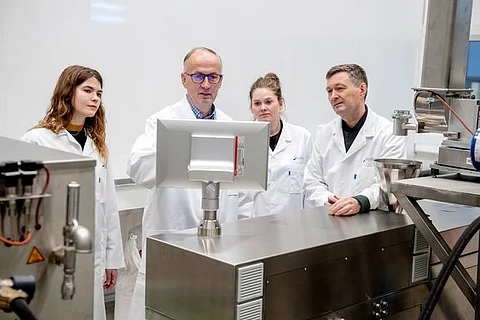

Tor Andreas Samuelsen (right) and colleagues at one of the extruders used in feed research.
Helge Skodvin Nofima
Norwegian Institute of Food, Fisheries and Aquaculture Research (Nofima) researchers have concluded that microalgae can be considered a sustainable ingredient for salmon feed after several trials in which salmon accepted all the experimental feeds.
For the trials, Nofima has used the algae-based product rich in the marine omega-3 fatty acid DHA, AlgaPrime™ DHA LS, provided by Corbion. Additionally, the research was funded by the Research Council of Norway and the industrial project partners MOWI, Labyerie fine foods, Cargill, Corbion, Innovafeed, and Auchan.
Regarding these conclusions, Tim Rutten, Vice President of Nutrition at Corbion has previously stated: "Corbion is constantly seeking to create new innovative and sustainable solutions, and we are pleased that the results of this study affirm the technical performance of our product is enabling the industry to use a sustainable source of omega-3 at high inclusion levels."
Through the Millennial Salmon project, Nofima aims to determine how much algae-based product can be included in a salmon pellet and how it subsequently affects their performance.
The research process begins when the new ingredient arrives at the feed technology center and continues until it is consumed by the salmon, which then grows to slaughter size.
"What was exciting in this research was that to be able to design the feeds for the fish trial, we first had to conduct a technical evaluation of the ingredient to determine what levels we could achieve in the fish trial. For this algae product, we simply needed to get to know it technically first," explained senior researcher Tor Andreas Samuelsen.
During the trials, researchers at Nofima's Aquafeed Technology Centre in Bergen measured the hardness, water stability, oil leakage, and pellet pore size.
Subsequently, the trial feeds were produced and sent to Nofima's research station in Sunndalsøra, where the salmon were fed and their growth was monitored and evaluated.
Exactly one year ago, Nofima confirmed that microalgae can exhibit faster growth and increased omega-3 production through selective breeding, making them a more compelling option as a feed ingredient.
